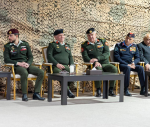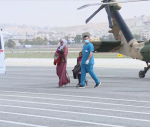You are here
The West must face reality in Ukraine
Oct 29,2024 - Last updated at Oct 29,2024
MOSCOW – Harvard’s Graham Allison commented that, while China “is and will be the fiercest rival a ruling power has ever faced,” the current “demonisation” of the country “confuses more than it clarifies.” To “create and sustain a strategy for meeting the China challenge,” Allison insists, the United States “must understand China for what it is” – neither “ten feet tall” nor “on the brink of collapse.” Post-Soviet Russia has never received such consideration.
On the contrary, the US has spent decades caricaturing Russia as both a quintessential villain and a fragile has-been. After Russia’s 2014 annexation of Crimea, then-President Barack Obama dismissed it as a “regional power” displaying its own weakness. And following the full-scale invasion of Ukraine last year, the apparent assumption was that Russia – and Vladimir Putin’s regime, would quickly crumble under the weight of Western sanctions.
Putin’s decision to invade Ukraine was fuelled by delusion. But that does not mean that the West’s assessment of the situation was sensible. On the contrary, most Western observers seemed to be able to imagine just two scenarios: either Putin takes Kyiv in a matter of days, turning Ukraine into a Kremlin puppet, or Russia is quickly defeated, forcing Putin to withdraw his troops and recognise Ukraine’s territorial integrity.
This helps to explain why, when Russia’s initial offensive stalled, then-British Prime Minister Boris Johnson, visiting Kyiv, reportedly recommended that Ukraine should “just fight,” rather than negotiating a peace deal. Better to let Russia lose, weakening the country’s economy, depleting its military and damaging Putin’s position, possibly beyond repair, than to reward it for its invasion.
And Russia would lose, the narrative went. Whereas Ukraine had the West’s full-throated support, with weapon and aid flows to match, Russia did not have enough equipment, and what it did have was as outdated as its tactics. Beyond the battlefield, unprecedented Western sanctions were destined to trigger a harsh backlash against Putin; Russians might even storm the Kremlin in order to regain access to European handbags and American fast food. No one seemed to imagine that the demonization and dismissal of most things Russian could galvanise Russians against the West, or that Russia would be able to sustain a long war.
Yet this is precisely what has happened. Russia continued to leverage its numerical advantage, while updating its battlefield strategy and boosting production of military hardware. At home, it minimised the costs of the sanctions, not only by circumventing them, but also by making sure that local actors, including the Russian state, gained ownership of departing Western firms’ Russian operations at rock-bottom prices. Meanwhile, it built up its war economy.
For ordinary Russians, things are not bad at all. Store shelves are well-stocked, and restaurants are bustling. Pensions and salaries have increased, not as much as inflation, but enough to support the Kremlin-backed narrative that Russia is standing strong, despite the West’s best efforts to destroy it. Far from recognising how dangerous this narrative is, Western leaders continue to reinforce it, with Polish President Andrzej Duda, for example, saying in June, at the start of Ukraine’s failed counteroffensive that “Russians need to feel the bitter taste of defeat.”
The war is still not popular in Russia: 56 per cent of the Russians surveyed in October last year by the Levada Center expressed support for transitioning to peace talks. At the same time, just 34 per cent of respondents reported that they would support withdrawing Russian troops from Ukraine and returning Russian-controlled Ukrainian territory. Meanwhile, Putin’s approval rating remains above 80 per cent. Call it the Stalingrad effect.
While Russians rally around Putin, Ukraine’s Western backers seem to be losing their resolve. European Union leaders has failed to push through a €50 billion financial-aid package for Ukraine, though they have agreed to start EU accession talks. This failure came as the US Congress gave up on passing a new military-aid package for Ukraine this year.
US President Joe Biden is promising that the US will stand with Ukraine not for “as long as it takes,” as he used to claim, but for “as long as we can.” He still argues that Russia lacks the “resources and capacity” to sustain a long war in Ukraine, and it is true that sanctions will ultimately take a toll on Russia’s economy. But Putin will throw everything he has at this war, and will likely maintain considerable popular support along the way.
The decline in foreign aid is already weakening Ukraine’s position on the battlefield, after a year of few tangible gains by Ukrainian forces. Meanwhile, a rift seems to be growing between Zelensky and the Ukrainian military’s commander-in-chief, General Valery Zaluzhny.
There are three plausible scenarios. First, the West recommits to supporting Ukraine. But the political hurdles, Republican opposition in the US, and a Hungarian (and now Slovak) veto in the EU, are high. Even if they are cleared, Ukraine will struggle to recruit enough new soldiers.
In the second scenario, NATO puts boots on the ground in Ukraine. Though Putin has never had any intention of invading a NATO member country, the narrative that a Russian victory in Ukraine would lead to more Russian invasions could be used to justify committing Western troops. The risk is that the Stalingrad effect would be turbocharged, Russians would rise up to defend the Motherland, and instability would engulf Europe.
In the third scenario, the West finds ways to communicate with the Kremlin. Russia is far from invulnerable, but it is not on the brink of collapse, and Putin probably has several years ahead of him as president. Even if he were removed from power, Russians’ deep mistrust of the West would persist. Given this, and the harsh reality that Ukraine is unlikely to reclaim all of its territory, the West should focus on bolstering Ukraine’s defenses, while preparing to seize any opportunity to engage in realistic talks with the Kremlin.
Nina L. Khrushcheva, Professor of International Affairs at The New School, is the co-author (with Jeffrey Tayler) of In Putin’s Footsteps: Searching for the Soul of an Empire Across Russia’s Eleven Time Zones (St. Martin’s Press, 2019). Copyright: Project Syndicate, 2023. www.project-syndicate.org













Add new comment